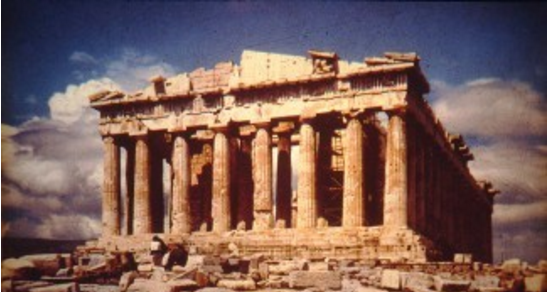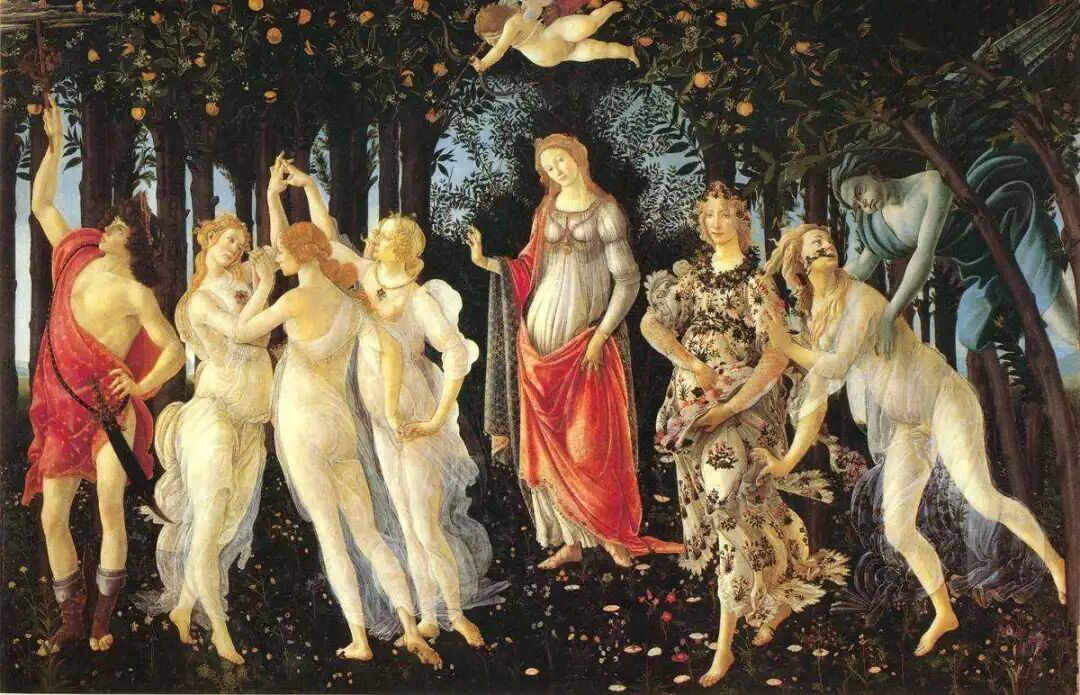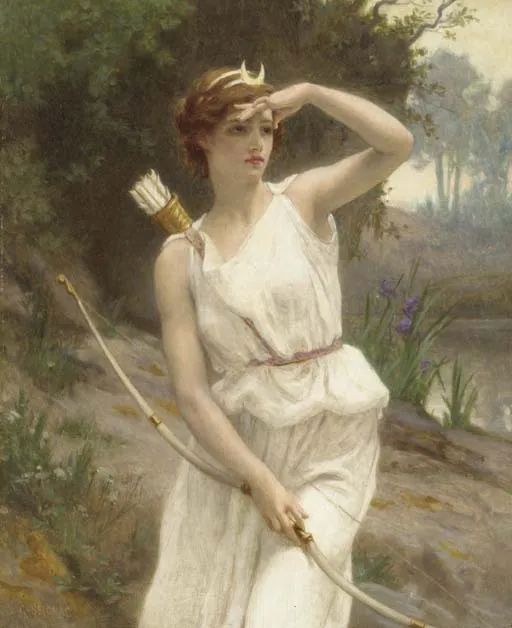
Hi, click🔝 to follow!Western culture has two sources: one is Hellenic culture and the other is Hebrew culture. Greek mythology has a profound influence on English.This is reflected in vocabulary, as English has absorbed some words and continues to use them, which can be either compound words or derivable words.The information contained in these etymologies not only helps readers accurately understand the meanings of each word, adding enjoyment to memorizing vocabulary, but also particularly records and describes the differences and exchanges between English and ancient Greek culture, making it historically significant and interesting.Since Roman mythology is heavily influenced by Greek mythology, the storylines are often very similar, differing only in names, so Greek mythology is often associated with Roman mythology.Greek and Roman mythology is like a fountain in mythological stories, nourishing the vocabulary of English, producing many beautiful and captivating vocabulary stories, enhancing the vitality of the English language. 1. English Vocabulary Derived from the Names of Gods in Greek and Roman MythologyIn modern English, many words originate from the names of gods in Greek and Roman mythology and still play an important role today. Typical examples include:1.Flora: The goddess of flowers in ancient Greek and Roman mythology. She married Zephyr, the god of the west wind, who gifted her a garden full of exotic flowers.In spring, Flora and her husband Zephyr stroll hand in hand in the garden, and wherever they walk, flowers bloom. Flora in modern English refers to “plants.” Derivative words: flower, flour, flourish, floral, florist.2.The Muses(Muses): The goddesses of the arts in Greek mythology.There are nine of them, representing history, lyric poetry, comedy (pastoral poetry), tragedy, dance, love poetry, hymns, astronomy, and epic. The arts derived from the Muses give rise to the word music, and the place where art is collected is called a museum. The joy brought by art is called muse, amusement.3.Pan(Pan): The god of shepherds and forests, who roars loudly when disturbed. Derivative word: panic.4.Titan(Titan): A member of the giant race that once ruled the world. Titan in modern English refers to a tall and strong person, an important figure. Derivative word: titanic, meaning huge, enormous. The Titanic is named after this.5.Zephyrus(Zephyrus): The god of the west wind. Derivative word: zephyr (west wind, gentle breeze).6.Atlas: Atlas, one of the Titans in Greek mythology, was punished by Zeus for betraying him by bearing the heavens on his shoulders at the edge of the world.In the 16th century, geographer Mercator used Atlas as the title for a book of maps. Later, others followed suit, and atlas came to mean a collection of maps or a person bearing a heavy burden. Other derivative words: Atlantic.7.Ceres: The goddess of agriculture. During a great drought in ancient Rome, priests sought the help of a witch, and the divination result was to establish a new goddess, Ceres, to whom they would offer sacrifices so that she would bring rain to the earth.From then on, Ceres became the goddess of agriculture. The word cereal comes from Latin, meaning “of Ceres,” belonging to the goddess of grain. Derivative word: cereals (grains, breakfast cereals).8.Cronos: The father of Zeus. Fearing rebellion from his children, he swallowed his offspring. Like ruthless time, he devours everything. Therefore, the root “chron” means “time.” Derivative words: chronic (time-consuming, chronic); chronology (the study of time, timeline).9.Eros(Eros): The god of love.He is a winged beautiful youth, equivalent to Cupid in Roman mythology. Whether Eros or Cupid, they spend their days flying around practicing archery, causing anxiety among everyone.Thus, the words derived from them all carry negative connotations: erotic (sexual); cupidity (greed).In China, the matchmaker is called a媒婆.
1. English Vocabulary Derived from the Names of Gods in Greek and Roman MythologyIn modern English, many words originate from the names of gods in Greek and Roman mythology and still play an important role today. Typical examples include:1.Flora: The goddess of flowers in ancient Greek and Roman mythology. She married Zephyr, the god of the west wind, who gifted her a garden full of exotic flowers.In spring, Flora and her husband Zephyr stroll hand in hand in the garden, and wherever they walk, flowers bloom. Flora in modern English refers to “plants.” Derivative words: flower, flour, flourish, floral, florist.2.The Muses(Muses): The goddesses of the arts in Greek mythology.There are nine of them, representing history, lyric poetry, comedy (pastoral poetry), tragedy, dance, love poetry, hymns, astronomy, and epic. The arts derived from the Muses give rise to the word music, and the place where art is collected is called a museum. The joy brought by art is called muse, amusement.3.Pan(Pan): The god of shepherds and forests, who roars loudly when disturbed. Derivative word: panic.4.Titan(Titan): A member of the giant race that once ruled the world. Titan in modern English refers to a tall and strong person, an important figure. Derivative word: titanic, meaning huge, enormous. The Titanic is named after this.5.Zephyrus(Zephyrus): The god of the west wind. Derivative word: zephyr (west wind, gentle breeze).6.Atlas: Atlas, one of the Titans in Greek mythology, was punished by Zeus for betraying him by bearing the heavens on his shoulders at the edge of the world.In the 16th century, geographer Mercator used Atlas as the title for a book of maps. Later, others followed suit, and atlas came to mean a collection of maps or a person bearing a heavy burden. Other derivative words: Atlantic.7.Ceres: The goddess of agriculture. During a great drought in ancient Rome, priests sought the help of a witch, and the divination result was to establish a new goddess, Ceres, to whom they would offer sacrifices so that she would bring rain to the earth.From then on, Ceres became the goddess of agriculture. The word cereal comes from Latin, meaning “of Ceres,” belonging to the goddess of grain. Derivative word: cereals (grains, breakfast cereals).8.Cronos: The father of Zeus. Fearing rebellion from his children, he swallowed his offspring. Like ruthless time, he devours everything. Therefore, the root “chron” means “time.” Derivative words: chronic (time-consuming, chronic); chronology (the study of time, timeline).9.Eros(Eros): The god of love.He is a winged beautiful youth, equivalent to Cupid in Roman mythology. Whether Eros or Cupid, they spend their days flying around practicing archery, causing anxiety among everyone.Thus, the words derived from them all carry negative connotations: erotic (sexual); cupidity (greed).In China, the matchmaker is called a媒婆. 10.Hygeia: The Greek goddess of health, depicted as a young woman in a white robe (white coat), wearing a priest’s crown, feeding a snake with a bowl. Derivative word: hygiene (n. hygiene).11.Morpheus: The god of dreams in Greek mythology. He is the son of Hypnos, the god of sleep, and governs people’s dreams. Derivative words: morphine (morphine), marijuana (cannabis), both of which are derivatives of opium. Morphine has anesthetic properties.12.Chaos: The god of chaos who opened the heavens and the earth. Cosmos: the universe, an ordered whole.13.Zeus: The chief god, Zeus.14.Pluto: The god of the underworld; because of the “treasures of the underworld,” the root “-pluto” signifies “wealth”; e.g., plutocracy (rule by the wealthy); plutolatry (worship of wealth); Pluto (Pluto, the planet).15.Styx: The river that surrounds the underworld; the river of the dead; styx, stygian (of the river Styx, of the underworld; dark; gloomy).16.Lethe: The river of forgetfulness; drinking its water causes one to forget the past; forgetfulness.lethargic (drowsy).The three rivers of the underworld: Styx, Lethe, and Meander.abyss (hell, abyss); abysmal (deep; abyssal).17.Poseidon: The god of the sea, the sea king.18.Narcissus: Narcissus (a beautiful youth who died of self-love for his reflection in the water, turning into a daffodil).narcissus (a youth who boasts of his beauty; daffodil; self-admiration; narcissism (self-indulgence, narcissism).19.Echo: The goddess of the valley; infatuated with Narcissus, but Hera (Zeus’s wife) jealous of her beauty made Echo only able to repeat what others just said, and Narcissus thus abandoned Echo.20.Eris: The goddess of discord and revenge; to take revenge on Narcissus, she cursed him to die from his own beauty. eristic (argumentative, debatable; controversial; sophistical).21.Paris: The second prince of Troy; his love for Helen, the wife of King Menelaus, sparked the Trojan War.22.Hector: The great prince of Troy, brave and skilled in battle, a true warrior among men.hector (to bully; to torment).23.Sparta: Sparta (a city in the southern part of the Peloponnese in Greece; a major city in ancient Greece); to prepare for the Trojan War, all citizens lived a simple and hard life all year round.Spartan (simple, hard, strong, brave; warlike; severe).24.Stentor: (in Homer’s epic Iliad) a herald with a loud voice, whose voice could reach 50 men.stentor (a loud-voiced person); stentorian (loud-voiced).25.Odyssey: The epic of ancient Greece; a long journey filled with hardships. Odysseus (the protagonist of Homer’s epic “The Odyssey,” the king of Ithaca, who devised the wooden horse strategy in the Trojan War).26.Siren: The sea nymph, Siren (half-woman, half-bird, often uses her song to lure passing sailors to their doom).siren (a charming beauty; a whistle; an alarm); to tempt.27.Procrustes: Procrustes (a robber in ancient Greek legend from Attica, who would place his captured victims on an iron bed, cutting off parts of those who were too long and stretching those who were too short; he was later killed by Theseus using the same method).procrustean (forcing conformity; compelling compliance).28.Proteus: Proteus, the ever-changing sea god, a minor sea god.Protean (versatile, able to play many roles; multi-talented).29.Sibyl: (a female prophet or oracle in ancient Rome or Greece).30.Chimera: (the fire-breathing monster) Chimera (with a lion’s head, a goat’s body, and a serpent’s tail); a monster.Chimerical (fantastical, imaginary; whimsical, impossible).31.Iris: (the goddess of the rainbow who delivers messages for the gods).iridescent (rainbow-colored, brilliantly shining).32.Zephyr: The god of the west wind; a personification of the west wind; gentle breeze; light fabric.33.Academy: Plato’s school; an authoritative institution in a scientific field.34.Stoic: Stoic philosophy (founded by philosopher Zeno in Athens in the 4th century BC); asceticism.35.Peripateticism: The Peripatetic school (named after Aristotle, who taught while walking in the school).peripatetic (of the Peripatetic school; walking around).2. English Idioms Derived from Greek Mythology1.Pandora’s box: Pandora’s box (Pandora’s box): Prometheus stole fire from the gods for humanity, angering Zeus.Zeus decided to punish humanity, so he ordered Hephaestus to create a beautiful woman, Pandora, to seduce Prometheus’s brother, Epimetheus.As a result, Epimetheus fell for Pandora, and she opened the box, releasing evils, disasters, diseases, and misfortunes, leaving only “hope” inside.Thus, Pandora’s box became synonymous with “the source of disaster.” Prometheus/Epimetheus (the root epi means “after” and pro means “before”).2.The sword of Damocles: Damocles was a minister in the Syracusan dynasty who envied the wealth and power of kings. One day, the king let him sit on the throne and hung a sword above his head by a hair, telling him that the danger of kingship is like that sword, which could fall at any moment.Thus, the sword of Damocles became synonymous with “the hidden dangers of wealth” and can also refer to a critical situation.3.Damon and Pythias: Damon and Pythias were good friends.Pythias was sentenced to death, and to allow him to visit his family, Damon stayed in prison as a hostage, agreeing to be executed if Pythias did not return on time. When the deadline approached, Pythias returned just in time. The king was deeply moved and released both of them.Thus, Damon and Pythias means “friends who would die for each other.” 4.Penelop’s web: Derived from the epic “Odyssey.” Penelope is Odysseus’s wife, known for her fidelity.The Trojan War lasted ten years, and Odysseus was delayed for another ten years on his way home. During this long twenty years, many nobles sought to marry Penelope, but she would say she must wait until she finished weaving a cloth, and at night, she would unravel what she had woven during the day.Thus, Penelope’s web became a metaphor for an unfinished task.5.Apple of discord: Meaning “the source of discord, the cause of disputes; generally refers to the catalyst of major events.”When Peleus and Thetis held their wedding, they forgot to invite Eris, the goddess of discord. This goddess was furious and left a golden apple inscribed with “to the fairest,” causing a dispute among Athena, Hera, and Aphrodite. This incident led to the long Trojan War.6.Judgment of Paris: Meaning “to prefer beauty over power.” Eris crashed the gathering of the gods and left a golden apple. The three goddesses competed for the apple and decided to let Zeus decide, but Zeus could not choose between his wife, the goddess of wisdom, and the goddess of love and beauty.In a dilemma, Zeus looked down to earth and saw Paris, the second prince of Troy, tending sheep, and thus gave the decision to Paris.The three goddesses offered him “the greatest territory,” “the wisest mind,” and “the most beautiful woman” as temptations, and ultimately, Paris made his judgment, choosing Venus and winning the most beautiful woman.7.Helen of Troy: Because Helen caused the fall of Troy, “Helen of Troy” became synonymous with “a beautiful woman who brings disaster.” 8.The Trojan horse: Meaning “a destructive thing or person that deceives the enemy or opponent into thinking it is beneficial to them.”During the Trojan War, the Greeks built a huge wooden horse, hiding soldiers inside. They pretended to abandon the horse and left it as a gift, and the Trojans brought it into the city. At midnight, the soldiers climbed out of the horse and killed the people in the city. Troy fell.The Trojan Horse has become a widely used idiom, often used to refer to hidden dangers; covert wreckers; engaging in underhand activities, etc.9.Stables of Augeas: Meaning “the dirtiest place; a pile of accumulated problems that are difficult to solve.”King Augeas of Elis had thousands of cattle, and his stables had not been cleaned for thirty years. Hercules cleaned them in one day.10.Achilles’ heel: Achilles, a Greek warrior, a blend of man and god. After birth, he was held by his mother and dipped in the river Styx, making him invulnerable except for his heel. He ultimately died from Paris’s arrow during the Trojan War.Achilles’ heel means “no one is perfect, everyone has a fatal weakness or flaw.” 11.Swan song: Literally translated as “the song of the swan,” derived from the Greek idiom Kykneion asma. In ancient Greek mythology, the swan is Apollo’s sacred bird, often used to symbolize literature.It is said that swans do not sing until they die, and before they die, they must sing one last song, which is beautiful and moving, the only song of their life.Thus, in modern English, this idiom metaphorically refers to a poet, writer, or composer’s final masterpiece before death, or an actor or singer’s last performance.As early as the 6th century BC, the ancient Greek fable writer Aesop mentioned the saying “the swan sings only before it dies.”In England, great poets and playwrights like Chaucer and Shakespeare have used this idiom. For example, in Shakespeare’s famous tragedy “Othello,” the character Emilia, at the moment of death, stands up to expose her husband’s crimes, comparing herself to a swan, singing her last song.12.Under the rose: Literally translated as “under the rose.” Derived from an ancient Roman myth.The god of love, Cupid, is the son of Venus, the goddess of love and beauty, and Mars, the god of war.To protect his mother’s reputation, Cupid sent a bouquet of roses to Harpocrates, the god of silence, asking him to keep quiet and not spread rumors about Venus’s affairs. Harpocrates accepted the roses and became the true “god of silence.” Due to this myth, the ancient Romans regarded roses as symbols of silence or secrecy, and it became a custom in daily life. When guests visited, if they saw a rose painted above the host’s table, they understood that everything discussed at that table should not be shared outside. Thus, “under the rose” came to mean “secretly, privately, in secret.” 13.Sphinx: The Sphinx, a creature with the body of a lion and the head of a human; Sphinx’s riddle, a riddle that has puzzled for millennia.sphinx riddle.
10.Hygeia: The Greek goddess of health, depicted as a young woman in a white robe (white coat), wearing a priest’s crown, feeding a snake with a bowl. Derivative word: hygiene (n. hygiene).11.Morpheus: The god of dreams in Greek mythology. He is the son of Hypnos, the god of sleep, and governs people’s dreams. Derivative words: morphine (morphine), marijuana (cannabis), both of which are derivatives of opium. Morphine has anesthetic properties.12.Chaos: The god of chaos who opened the heavens and the earth. Cosmos: the universe, an ordered whole.13.Zeus: The chief god, Zeus.14.Pluto: The god of the underworld; because of the “treasures of the underworld,” the root “-pluto” signifies “wealth”; e.g., plutocracy (rule by the wealthy); plutolatry (worship of wealth); Pluto (Pluto, the planet).15.Styx: The river that surrounds the underworld; the river of the dead; styx, stygian (of the river Styx, of the underworld; dark; gloomy).16.Lethe: The river of forgetfulness; drinking its water causes one to forget the past; forgetfulness.lethargic (drowsy).The three rivers of the underworld: Styx, Lethe, and Meander.abyss (hell, abyss); abysmal (deep; abyssal).17.Poseidon: The god of the sea, the sea king.18.Narcissus: Narcissus (a beautiful youth who died of self-love for his reflection in the water, turning into a daffodil).narcissus (a youth who boasts of his beauty; daffodil; self-admiration; narcissism (self-indulgence, narcissism).19.Echo: The goddess of the valley; infatuated with Narcissus, but Hera (Zeus’s wife) jealous of her beauty made Echo only able to repeat what others just said, and Narcissus thus abandoned Echo.20.Eris: The goddess of discord and revenge; to take revenge on Narcissus, she cursed him to die from his own beauty. eristic (argumentative, debatable; controversial; sophistical).21.Paris: The second prince of Troy; his love for Helen, the wife of King Menelaus, sparked the Trojan War.22.Hector: The great prince of Troy, brave and skilled in battle, a true warrior among men.hector (to bully; to torment).23.Sparta: Sparta (a city in the southern part of the Peloponnese in Greece; a major city in ancient Greece); to prepare for the Trojan War, all citizens lived a simple and hard life all year round.Spartan (simple, hard, strong, brave; warlike; severe).24.Stentor: (in Homer’s epic Iliad) a herald with a loud voice, whose voice could reach 50 men.stentor (a loud-voiced person); stentorian (loud-voiced).25.Odyssey: The epic of ancient Greece; a long journey filled with hardships. Odysseus (the protagonist of Homer’s epic “The Odyssey,” the king of Ithaca, who devised the wooden horse strategy in the Trojan War).26.Siren: The sea nymph, Siren (half-woman, half-bird, often uses her song to lure passing sailors to their doom).siren (a charming beauty; a whistle; an alarm); to tempt.27.Procrustes: Procrustes (a robber in ancient Greek legend from Attica, who would place his captured victims on an iron bed, cutting off parts of those who were too long and stretching those who were too short; he was later killed by Theseus using the same method).procrustean (forcing conformity; compelling compliance).28.Proteus: Proteus, the ever-changing sea god, a minor sea god.Protean (versatile, able to play many roles; multi-talented).29.Sibyl: (a female prophet or oracle in ancient Rome or Greece).30.Chimera: (the fire-breathing monster) Chimera (with a lion’s head, a goat’s body, and a serpent’s tail); a monster.Chimerical (fantastical, imaginary; whimsical, impossible).31.Iris: (the goddess of the rainbow who delivers messages for the gods).iridescent (rainbow-colored, brilliantly shining).32.Zephyr: The god of the west wind; a personification of the west wind; gentle breeze; light fabric.33.Academy: Plato’s school; an authoritative institution in a scientific field.34.Stoic: Stoic philosophy (founded by philosopher Zeno in Athens in the 4th century BC); asceticism.35.Peripateticism: The Peripatetic school (named after Aristotle, who taught while walking in the school).peripatetic (of the Peripatetic school; walking around).2. English Idioms Derived from Greek Mythology1.Pandora’s box: Pandora’s box (Pandora’s box): Prometheus stole fire from the gods for humanity, angering Zeus.Zeus decided to punish humanity, so he ordered Hephaestus to create a beautiful woman, Pandora, to seduce Prometheus’s brother, Epimetheus.As a result, Epimetheus fell for Pandora, and she opened the box, releasing evils, disasters, diseases, and misfortunes, leaving only “hope” inside.Thus, Pandora’s box became synonymous with “the source of disaster.” Prometheus/Epimetheus (the root epi means “after” and pro means “before”).2.The sword of Damocles: Damocles was a minister in the Syracusan dynasty who envied the wealth and power of kings. One day, the king let him sit on the throne and hung a sword above his head by a hair, telling him that the danger of kingship is like that sword, which could fall at any moment.Thus, the sword of Damocles became synonymous with “the hidden dangers of wealth” and can also refer to a critical situation.3.Damon and Pythias: Damon and Pythias were good friends.Pythias was sentenced to death, and to allow him to visit his family, Damon stayed in prison as a hostage, agreeing to be executed if Pythias did not return on time. When the deadline approached, Pythias returned just in time. The king was deeply moved and released both of them.Thus, Damon and Pythias means “friends who would die for each other.” 4.Penelop’s web: Derived from the epic “Odyssey.” Penelope is Odysseus’s wife, known for her fidelity.The Trojan War lasted ten years, and Odysseus was delayed for another ten years on his way home. During this long twenty years, many nobles sought to marry Penelope, but she would say she must wait until she finished weaving a cloth, and at night, she would unravel what she had woven during the day.Thus, Penelope’s web became a metaphor for an unfinished task.5.Apple of discord: Meaning “the source of discord, the cause of disputes; generally refers to the catalyst of major events.”When Peleus and Thetis held their wedding, they forgot to invite Eris, the goddess of discord. This goddess was furious and left a golden apple inscribed with “to the fairest,” causing a dispute among Athena, Hera, and Aphrodite. This incident led to the long Trojan War.6.Judgment of Paris: Meaning “to prefer beauty over power.” Eris crashed the gathering of the gods and left a golden apple. The three goddesses competed for the apple and decided to let Zeus decide, but Zeus could not choose between his wife, the goddess of wisdom, and the goddess of love and beauty.In a dilemma, Zeus looked down to earth and saw Paris, the second prince of Troy, tending sheep, and thus gave the decision to Paris.The three goddesses offered him “the greatest territory,” “the wisest mind,” and “the most beautiful woman” as temptations, and ultimately, Paris made his judgment, choosing Venus and winning the most beautiful woman.7.Helen of Troy: Because Helen caused the fall of Troy, “Helen of Troy” became synonymous with “a beautiful woman who brings disaster.” 8.The Trojan horse: Meaning “a destructive thing or person that deceives the enemy or opponent into thinking it is beneficial to them.”During the Trojan War, the Greeks built a huge wooden horse, hiding soldiers inside. They pretended to abandon the horse and left it as a gift, and the Trojans brought it into the city. At midnight, the soldiers climbed out of the horse and killed the people in the city. Troy fell.The Trojan Horse has become a widely used idiom, often used to refer to hidden dangers; covert wreckers; engaging in underhand activities, etc.9.Stables of Augeas: Meaning “the dirtiest place; a pile of accumulated problems that are difficult to solve.”King Augeas of Elis had thousands of cattle, and his stables had not been cleaned for thirty years. Hercules cleaned them in one day.10.Achilles’ heel: Achilles, a Greek warrior, a blend of man and god. After birth, he was held by his mother and dipped in the river Styx, making him invulnerable except for his heel. He ultimately died from Paris’s arrow during the Trojan War.Achilles’ heel means “no one is perfect, everyone has a fatal weakness or flaw.” 11.Swan song: Literally translated as “the song of the swan,” derived from the Greek idiom Kykneion asma. In ancient Greek mythology, the swan is Apollo’s sacred bird, often used to symbolize literature.It is said that swans do not sing until they die, and before they die, they must sing one last song, which is beautiful and moving, the only song of their life.Thus, in modern English, this idiom metaphorically refers to a poet, writer, or composer’s final masterpiece before death, or an actor or singer’s last performance.As early as the 6th century BC, the ancient Greek fable writer Aesop mentioned the saying “the swan sings only before it dies.”In England, great poets and playwrights like Chaucer and Shakespeare have used this idiom. For example, in Shakespeare’s famous tragedy “Othello,” the character Emilia, at the moment of death, stands up to expose her husband’s crimes, comparing herself to a swan, singing her last song.12.Under the rose: Literally translated as “under the rose.” Derived from an ancient Roman myth.The god of love, Cupid, is the son of Venus, the goddess of love and beauty, and Mars, the god of war.To protect his mother’s reputation, Cupid sent a bouquet of roses to Harpocrates, the god of silence, asking him to keep quiet and not spread rumors about Venus’s affairs. Harpocrates accepted the roses and became the true “god of silence.” Due to this myth, the ancient Romans regarded roses as symbols of silence or secrecy, and it became a custom in daily life. When guests visited, if they saw a rose painted above the host’s table, they understood that everything discussed at that table should not be shared outside. Thus, “under the rose” came to mean “secretly, privately, in secret.” 13.Sphinx: The Sphinx, a creature with the body of a lion and the head of a human; Sphinx’s riddle, a riddle that has puzzled for millennia.sphinx riddle. 14.Exodus: A mass departure for work; Exodus (the book of Exodus).Losing farmland results in a tendency for farmers to exodus.-END-Island / MasterUncle Wai. Virgo, workaholic. Walking on the edge of ideals and reality, founder of many core brands in foreign language publishing, founder of the Waiyu APP, founder of the Lu Gongzi reading pen, and the new Quokka’s general agent in China. I am Uncle Wai, here waiting for the wind, waiting for you, and your emotional stories.
14.Exodus: A mass departure for work; Exodus (the book of Exodus).Losing farmland results in a tendency for farmers to exodus.-END-Island / MasterUncle Wai. Virgo, workaholic. Walking on the edge of ideals and reality, founder of many core brands in foreign language publishing, founder of the Waiyu APP, founder of the Lu Gongzi reading pen, and the new Quokka’s general agent in China. I am Uncle Wai, here waiting for the wind, waiting for you, and your emotional stories.




More information on quality original books, please followRecent good articles 1. Explosive! China's diplomatic team: This is the real "cool" that speaks with strength.
2. A man shot and killed his son after he got vaccinated, then committed suicide.
3. The high-priced fake painting: a Chinese grandfather destroyed the circle of American billionaires.
4. Shocked! After Biden fell three times boarding the plane, did he endorse Chinese elderly shoes?
5. 50 hilarious Dunhuang murals, see how unserious the ancients were...
6. Is the 34-year-old strong and tragic woman the next C-position female hero of the Avengers? Marvel, you have no heart.
7. A photo of a 90s female auxiliary police officer's extortion case turned out to be stolen! Your selfies can bring danger and harm in an instant!
▼
If you like it, give me a“thumbs up”

Please give me a WOW.▼